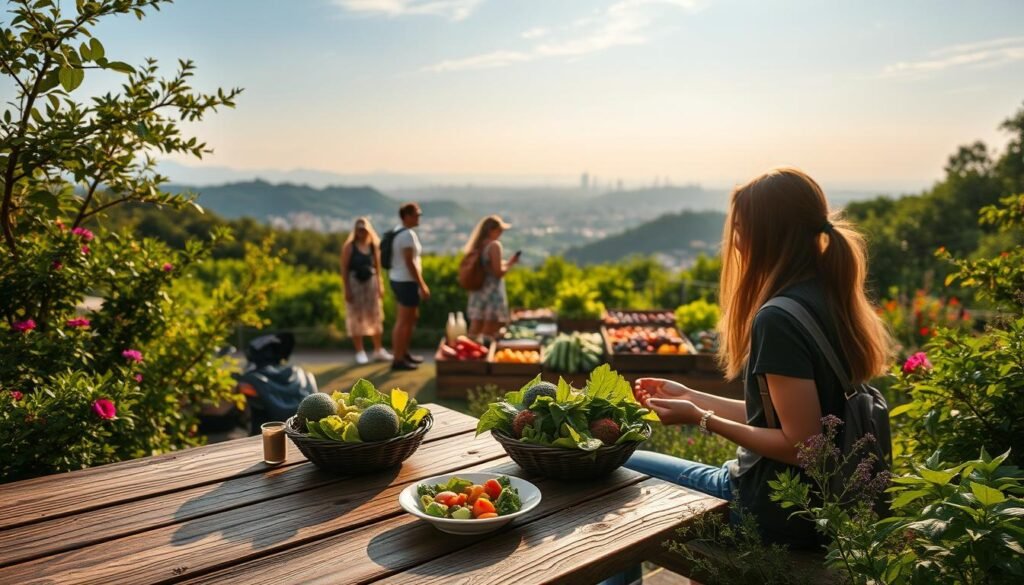Sustainable Travel Tips for Greener Getaways
Exploring the world means thinking about how we impact it. The tourism industry is a big source of greenhouse gases. So, it’s key for us to use eco-friendly practices.
We can lessen our environmental harm by making smart choices. This is what sustainable travel is all about. It’s about traveling in a way that doesn’t hurt the planet.
Key Takeaways
- Reduce your carbon footprint by choosing eco-friendly transportation
- Support local communities by staying in locally-owned accommodations
- Minimize waste by avoiding single-use plastics
- Respect local cultures and traditions
- Conserve natural resources by opting for energy-efficient activities
Understand the Principles of Sustainable Travel
Learning about sustainable travel is key to making good choices that help both you and the place you visit. As travelers, we can positively impact the places we go to.
What is Sustainable Travel (travel tips)?
Sustainable travel (travel tips) is more than just cutting down on carbon emissions. It’s also about respecting local cultures and environments. Responsible tourism advice tells us to reduce waste, save resources, and support local people.
Some important parts of sustainable travel tips are:
- Using eco-friendly ways to get around
- Choosing local places to stay and eat
- Respecting cultural sites and traditions
Importance of Eco-Friendly Practices
Practicing eco-friendliness is critical to keep tourist spots beautiful and intact. By following sustainable travel tips and practices, we can lessen our harm to the environment. This means using less plastic, saving water, and not throwing trash.
The good things about eco-friendly actions are:
- Protecting nature and wildlife
- Keeping cultural sites safe
- Helping local economies grow through green tourism
In summary, knowing and using sustainable travel rules is vital for our planet’s and cultures’ future. By choosing wisely, we help make a better world for everyone.
Plan Your Trip with Sustainability in Mind
When planning your trip, think about how you can be kind to the planet. This means choosing where to go and when wisely. It’s all about making choices that are good for the environment.
Choose Eco-Friendly Destinations
It’s important to pick places that care about the planet. Look for spots with eco-friendly initiatives. These could be places with green energy, good waste management, or efforts to protect nature.
Some great examples include:
- National parks that support wildlife conservation
- Towns with strong environmental policies
- Islands that use renewable energy sources
By choosing these places, you help local economies and support green practices.
Consider Off-Peak Travel
Traveling when it’s not busy has many perks. It spreads out tourism, easing the pressure on popular spots. Plus, you get to enjoy:
- Less crowded places for a better experience
- Lower prices for places to stay and things to do
- A real taste of local culture, away from big tourist groups
Off-peak travel lets you relax more and supports a greener tourism industry.
To make your trip even greener, learn about local customs and environmental issues. This way, you’ll have a richer experience and help the local environment and community.
Choose Sustainable Accommodation Options
The choice of where to stay can greatly affect the environment. More people now want to travel in a way that’s good for the planet. This has led to more places that are kind to the earth, like eco-friendly hotels and lodges.
Eco-Conscious Hotels and Lodges
Eco-conscious hotels and lodges are at the forefront of sustainable travel (travel tips). They use green practices like renewable energy and local materials. Look for places with LEED or EarthCheck certifications to know they care about the environment.
Some hotels go beyond being green. They use sustainable design and support local culture. This makes your stay better and helps the community. For example, they might use materials from nearby towns to cut down on transportation emissions.
| Feature | Eco-Conscious Hotels | Traditional Hotels |
|---|---|---|
| Energy Source | Renewable Energy | Fossil Fuels |
| Water Conservation | Advanced Systems | Basic Fixtures |
| Material Sourcing | Locally Sourced | Varied |
Benefits of Staying in Hostels
Hostels are a smart choice for eco-friendly travel (travel tips). They’re affordable and encourage people to meet and share experiences. Many hostels now have green initiatives like recycling and energy-saving gadgets.
Staying in hostels also helps local economies. They buy supplies from nearby shops and hire local people. This keeps money in the community.
- Reduced environmental impact through shared facilities
- Opportunities to meet other travelers and locals
- Often located in central, walkable areas, reducing the need for transportation
By picking eco-friendly places to stay, you can travel more sustainably. You’ll also have a more genuine and engaging trip.
Transportation Choices for the Eco-Conscious Traveler
Sustainable travel begins with how we travel from one place to another. The way we move can greatly affect the environment. Choosing green travel options helps reduce our impact and makes our trips better.
Use Public Transport and Shared Rides
Public transport is a top choice for lowering emissions. Buses, trains, and subways are good for the planet and let you meet locals. Shared ride services offer a personal touch while being eco-friendly.
- Research public transportation options at your destination before arriving.
- Consider purchasing a local transit card for convenience.
- Look for shared ride services or carpooling options.
Benefits of Cycling and Walking
Cycling and walking are green and let you see places up close. They let you explore at your own pace, enjoying the local atmosphere more than fast travel.

- Choose destinations with bike-friendly infrastructure.
- Pack light to make walking and cycling more manageable.
- Consider the health benefits of increased physical activity.
Eco-conscious travelers can lessen their environmental impact by smart travel tips and choices. Options like public transport, shared rides, cycling, or walking make sustainable travel easy.
Pack Light for a Smaller Carbon Footprint
Packing lightly is key to responsible tourism advice that’s often overlooked. Traveling with less luggage cuts down on carbon emissions. It also makes your trip more fun and efficient.
Essentials vs. Non-Essentials
Start by figuring out what’s essential and what’s not. Essentials include clothes, documents, and personal items you can’t do without. Non-essentials are things you can easily replace or don’t really need.
Think about what you’ll do and where you’re going. This helps you pack the right clothes and gear. You’ll need less luggage this way.
Tips for Efficient Packing
Efficient packing is an art that’s easy to learn. First, plan your outfits before you pack. Choose clothes that can be worn in different ways.
Next, use packing cubes or roll your clothes. This saves space in your luggage. It also helps you organize your stuff better.
- Limit yourself to a certain number of outfits or items.
- Pack multipurpose items that can serve more than one function.
- Avoid packing items that you know you won’t use.
By following these eco-friendly travel ideas, you can travel with less impact. The secret to packing well is planning and staying disciplined.
Make Responsible Food Choices
Choosing food wisely is key to sustainable travel. What you eat on vacation affects local economies and the environment.
Support Local Farmers and Markets
Supporting local farmers and markets is a smart choice. It helps the local economy and keeps traditional farming alive. Local markets have fresh, seasonal food that’s tasty and cuts down on carbon emissions.
Benefits of Supporting Local Farmers:
- Boosts the local economy
- Promotes biodiversity by preserving traditional crop varieties
- Offers fresher and more flavorful food options
Try Plant-Based Options
Plant-based meals are a great way to travel sustainably. Animal farming harms the environment a lot. Choosing plant-based meals cuts down on carbon emissions and supports green farming.

Plant-based diets are not only good for the planet, but they can also be incredibly delicious and varied. Trying local, plant-based foods is rewarding. It lets you find new tastes and support sustainable food systems.
Leave No Trace: Respecting Nature
As travelers, we must protect the beauty of our destinations. We should use practices that reduce our environmental impact. This way, the places we visit will stay beautiful for others in the future.
Follow the Leave No Trace Principles
The Leave No Trace principles help us travel responsibly. They include:
- Plan ahead and prepare
- Travel and camp on durable surfaces
- Dispose of waste properly
- Leave what you find
- Minimize campfire impacts
- Respect wildlife
- Be considerate of other visitors
By following these rules, we can lessen our environmental impact. For example, staying on trails prevents erosion and protects sensitive areas.
Proper Waste Disposal and Recycling
Proper waste disposal and recycling are key to sustainable travel. Always carry a reusable water bottle and say no to single-use plastics. If recycling is not available, pack out your waste and dispose of it properly when you get home.
Tips for Effective Waste Management:
- Carry a portable trash bag
- Avoid littering by disposing of waste in designated bins
- Choose products with minimal packaging
- Recycle whenever possible
By using these eco-conscious travel hacks, we can help keep our environment clean. Every small action we take can make a big difference. Together, we can create significant positive change.
Engage with Local Communities
Engaging with local communities is key to responsible tourism. It lets travelers positively impact the places they visit. This way, they can build understanding, respect, and cooperation between cultures.
One great way to connect with locals is through volunteer opportunities abroad. Many groups offer projects like environmental work, teaching, and community help. These projects help the community and give travelers a rewarding experience.
Volunteer Opportunities Abroad
When looking at volunteer work, pick projects that are sustainable and responsible. Choose organizations that are open and fair. This ensures their work really helps the local community.
Cultural Sensitivity and Awareness
Cultural sensitivity and awareness are vital when meeting locals. Travelers should try to understand and respect local customs and ways of life. It’s important to be aware of one’s own cultural biases and be open to learning.
Being culturally sensitive helps travelers make deeper connections with communities. This makes their trip more meaningful and contributes to positive tourism.
Make the Most of Your Travel Experience
Traveling is more than seeing new places. It’s about making memories and caring for our planet. By using eco-friendly travel ideas, you can enjoy your trip and help the environment.
Sustainable Memories
Creating lasting memories means being in the moment and loving the nature around you. Choose activities that don’t harm the environment, like hiking or visiting local markets. This way, you enjoy your trip and support green travel.
Inspiring Others
When you share your eco-friendly travel choices, you inspire others to do the same. Use social media, travel blogs, or talk to friends and family. This helps spread the word about responsible tourism and sustainable travel.

















[…] June 29, 2025Sustainable Travel Tips for Greener GetawaysDiscover top sustainable travel tips for g… […]